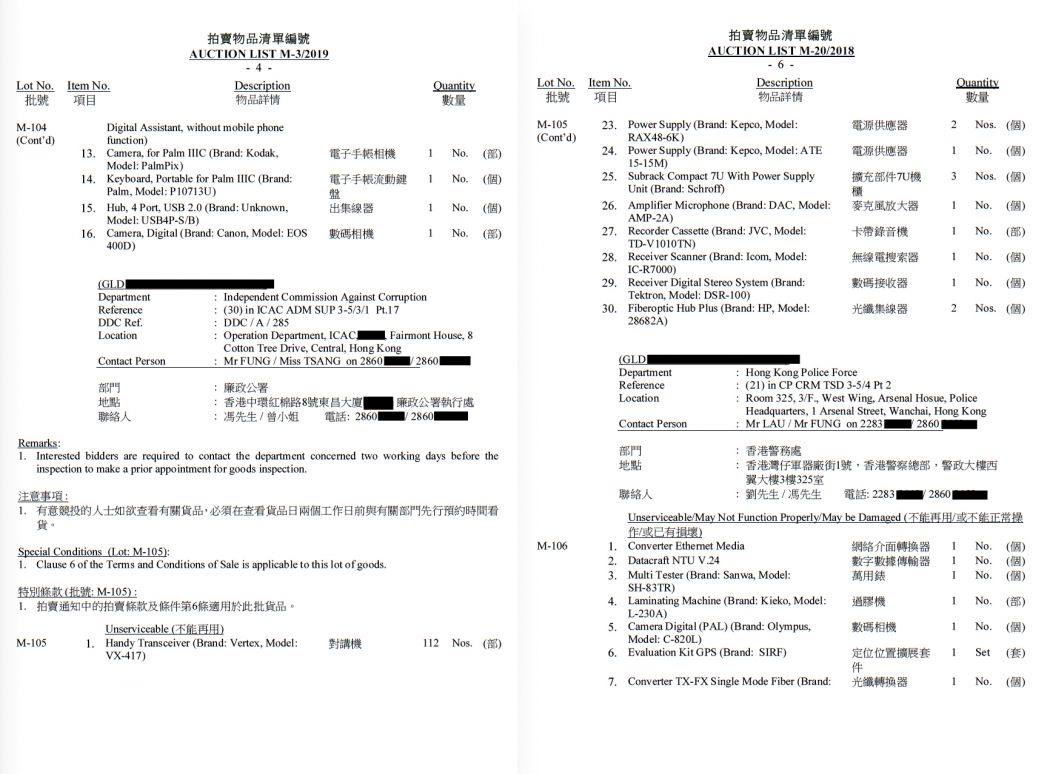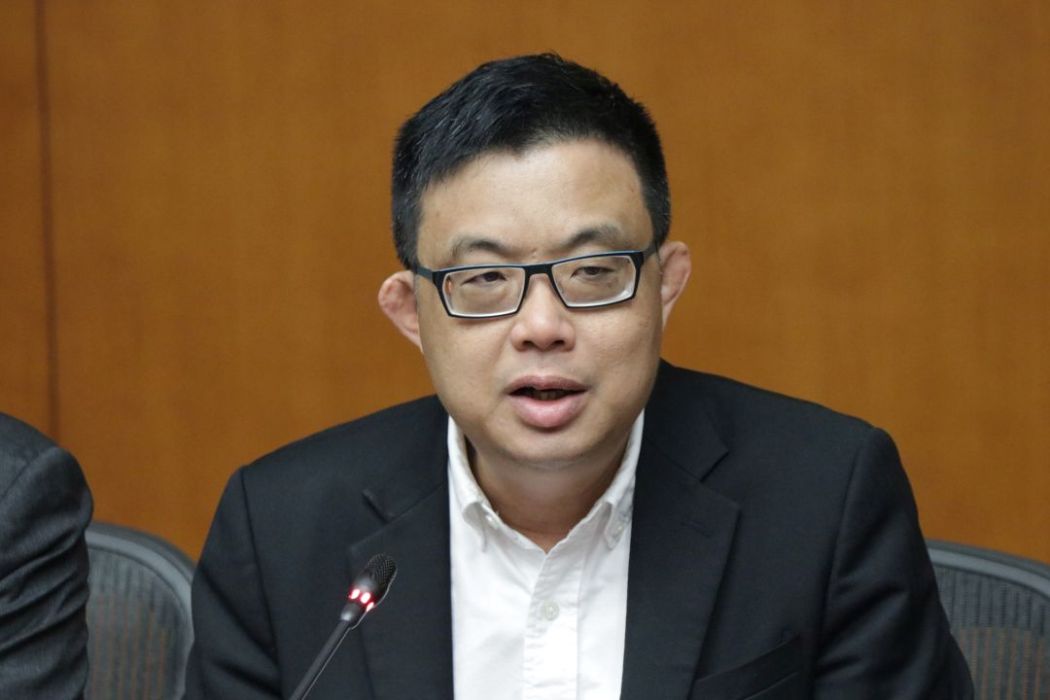An internal police division has installed a private line that connects the Wan Chai Police Headquarters in Hong Kong to a court in Shenzhen, China this August, lasting for a year, internal documents obtained by FactWire show.
The police said that the private line was temporarily installed for a criminal based in China to provide evidence remotely on a drug trafficking case, but the Hong Kong trial court is equipped with video conferencing facilities.
The internal unit, known as the Technical Services Division (TSD), consists of both officials from the Hong Kong Police Force and the Independent Commission Against Corruption (ICAC). They are in charge of gathering intelligence via hidden devices.

FactWire obtained documents, including a service request form, sales order form and order confirmation issued by WTT HK Limited, one of the largest fixed-line telecommunication operators in Hong Kong.
Dated July 12, the WTT HK Limited documents show that the Hong Kong Police filed an application for an International Ethernet Private Line (IEPL) for their office on Arsenal Street in Wan Chai, to connect with the criminal division of an intermediate people’s court in Shenzhen.
It is the first time the Hong Kong police have applied for similar services from WTT HK Limited. The private line was scheduled to be in use from 9 am on August 16. It is a “Gigabyte Passive Optical Network” that runs from point to point, hides activities from regular network users and is more immune to message interception. The year-long contract is paid monthly with an installation service fee of $68,000.

Documents dated July 9 show that the Hong Kong Police filed an application for an international ethernet private line (IEPL) for their office on Arsenal Street in Wan Chai, connecting to the criminal division of an intermediate people’s court in Shenzhen. The private line was scheduled to be in use at 9 am on August 16. (Parts of the content are covered). Photo: FactWire.
The private line was installed at room 522 of the Crime Wing Headquarters of Arsenal House West Wing building. The “Technical Services Division” of the police force appears as “TSD” on the documents.
The mailing address of the private line, which was stated as Fairmont House on Cotton Tree Drive in Central, appears to be an ICAC office, however. According to the Government Logistics Department auction list in 2019, the address is an office of ICAC Operations Department, listing “Mr. Fung” as the contact person. With the same contact number listed, “Mr. Fung” appears to be the contact person for the Hong Kong Police on the 2018 auction list. The listed police department code contains the letters “TSD”.
ICAC stated that their department had never set up any international ethernet private lines or any similar installations with the mainland. It confirmed with FactWire that the address at Fairmont House is an ICAC office, and the division works to provide technical support to the operations department on conducting investigations.

“Mr. Fung” is also listed as the contact person for the Hong Kong Police Force on the 2018 auction list. The listed police department code contains the letters “TSD”. (Parts of the content are covered). Photo: FactWire.
The Technical Services Division, a special unit that was already established before the handover of Hong Kong in 1997, comprises both ICAC and police officials, according to Hong Kong legislator James To Kun-sun of the Democratic Party.
The division consisted of 133 members led by a chief superintendent, a senior superintendent and five superintendents, said Andy Tsang Wai-hung, then-commissioner of the Hong Kong Police Force, in response to a legislator at a Legislative Council financial committee meeting in 2012. The division’s 2012-2013 annual budget was around $52 million, Tsang said.
The ICAC Technical Services Division consisted of 60 officials, including three senior officers, according to the then-commissioner of the ICAC Timothy Tong Hin-ming. He said the department provided technical support to the Operations Department in conducting investigations. The department’s expenditure between 2011 to 2012 amounted to around $38 million.
The Hong Kong Police Force was approved a funding of $8 million of the Capital Works Reserve Fund for Technical Services Division between 2016 and 2017. Work included replacement of the radio communication system and CCTV intelligence system.

The Technical Services Division is mainly in charge of gathering information for the Hong Kong police and ICAC via covert listening devices and hidden cameras. The evidence or intelligence collected by the division is only for internal use.
John Lee Ka-chiu, Secretary for Security, had worked as the chief superintendent of the Technical Services Division, according to a police journal in 2000.
The Hong Kong Police said the private line was to support cross-border video conference services for a case of conspiracy to traffic in dangerous drugs at West Kowloon Magistrates’ Courts on October 17, in accordance with the Evidence Ordinance which allows connecting to a mainland court for a criminal based in China to give evidence.
The response added that the wiring of the private line through the police headquarters was to make sure technical support was within reach. Since the video conference was encrypted, the police could not access information from the courts via the private line. The response added that the private line would be removed after the closing of the case.
However, there are currently three courts equipped with video conferencing facilities in West Kowloon Magistrates’ Court, a relatively new court that has been in use since 2016, according to a police press release in 2017.
An information technology staff from Judiciary told FactWire that no extra lines or video links were needed for the video conferencing facilities in court to function.

The equipped courts can connect and transmit videos with embedded encryption from three remote sites to the court with a “direct video link”, the court operation manual states.
The other site “should dial in to the court” unless there are difficulties of transmission, and prior settlement has been reached on the billing of ISDN, a specific form of connection usage. If so, a “gateway booking” with an external service provider will be required, costing more, the manual states.
To said it would be a cause of anxiety and people would wonder what kind of information was being sent to the mainland court if the trial did not use the video links provided in the trial court to connect with the mainland court, He thought that if there was a technical problem with the video links provided by the court, the police should explain it clearly to the public.
To said there are dedicated cables in the courts of Hong Kong, which should connect the mainland court and the Hong Kong courts directly.
If the police failed to explain why the cable went through the police headquarters first, it may raise concerns that the police may interfere or even stop the witness from giving evidence if the evidence does not sound favourable, To added. If that is the case, this unfair procedure may render the evidence inadmissible, so To believed that the DOJ should review the arrangement.

A direct line between the police headquarters and a mainland court is “definitely not normal” and unofficial, To said. He added that the police should exchange information with the mainland through the Liaison Office of the Central People’s Government in the HKSAR, the official communication bridge between Beijing and Hong Kong.
The Liaison Office coordinates police-related inquiries from overseas law enforcement units and local consulates, according to the 2018 Hong Kong Fact Sheets. It also maintains close liaison with the Mainland Public Security authorities, Police Liaison Department of the Liaison Office of the Central People’s Government in the HKSAR, Macau Police and Taiwan Police.
Lento Yip Yuk-fai, chairman of the Hong Kong Internet Service Providers Association, said he does not understand why the law enforcement department has to be a “middle point” for technical support when video conference setups are standard and require simple equipment. He said the police had yet to explain the technical needs behind this arrangement, the type of encryption currently used as well as how to make sure it would be foolproof.
The police did not say whether they had set up any other similar private lines with the mainland, as well as the respective departments located at Fairmont House and room 522 of the police headquarters.

The ICAC technical services division consisted of 60 officials, including three senior officials, according to the then-commissioner for ICAC Timothy Tong Hin-ming. He said the division works to provide technical support to the operations department on conducting investigations on corruption. The department’s expenditure between 2011 to 2012 was around $38 million. Photo: FactWire.
The Department of Justice merely confirmed that the case required the arrangement for victims to give evidence by video conferencing, dodging questions on whether the responsibility for the arrangement lies within the department or the police.
When facilities provided in courts or magistracies are to be used along with “services or materials provided by commercial entities”, such as telecommunications carriers providing video conferencing services, it shall be the responsibility of each party to “make contracts directly with such commercial entities and directly to meet their charges”, according to a practice direction of the Judiciary.
The Security Bureau replied that other law enforcement departments had not set up similar private lines with the mainland, but gave no more details.
